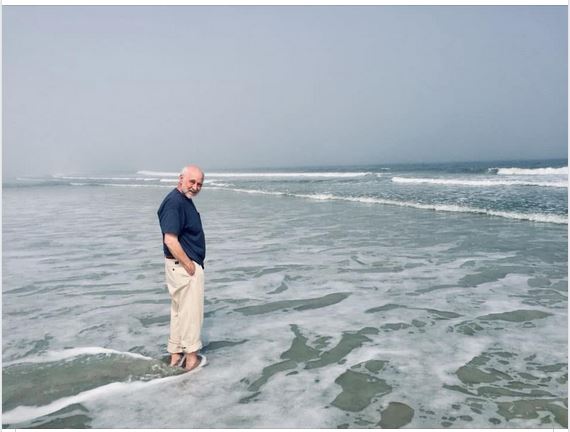
Jun 18, 2020
Bob Freeman died on May 31 at age 79. He was a painter, theater director and producer, gardener, deep thinker, sardonic humorist, dear friend to many, and devoted father to three now-grown children. To me he was the backbone of the HOME Van and, after his wife Arupa died five months ago, also its head and heart, serving the homeless and hungry out of the food pantry in his living room with just a few volunteers to help.
I’ve known Bob eighteen years, but we grew closer after Arupa’s death in December. Working with him on the HOME Van and to prepare for a memorial art show and poetry reading for Arupa, I came to know his generous heart. We were going through boxes of Arupa’s papers when someone came to the door for a food bag. Bob took it to him, and then came back in the room and took his jacket from the closet. “Bob, you can’t give him the jacket off your back.” “Oh, I can get another.”
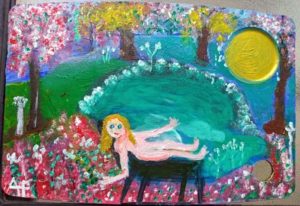
An Arupa painting
Gia, Ezra, and Peter, Bob’s three children, came to town to arrange the memorial service. Gainesville was on the fringes of tropical storm Cristobal and the heavens were weeping for Bob, so Joe and I set out with umbrellas to the gathering place, an early 20th Century house with porch and turrets. I saw some people I knew and many I didn’t. We gathered six feet apart on the lawn and porch, raising and lowering umbrellas as needed. We signed the guest book, one of Bob’s sketch books that he always carried, filled with pencil and watercolor drawings. A friend played a long mournful tune on her violin. Another read a letter from Anna, Bob’s first wife and mother of the children. All three children spoke – they had an idyllic hippie upbringing with Bob.
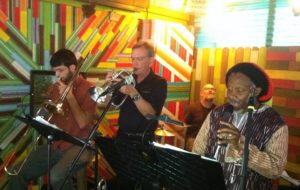
A few Jazz Bandits
We walked to the community garden, led by three brass instruments from the Jazz Bandits playing Swing Low, I’ll Fly Away, and many other lively gospel tunes. It rained, it stopped, it rained, it stopped, and then it came full force. We huddled under a couple of carports, still doing a pretty good job of distancing. Bob would have enjoyed our gathering under the No Trespassing signs, and the faint odor of marijuana.
When the rain subsided from torrential to steady, we walked on, past the Matheson Museum and through Sweetwater Park to the community garden. I don’t know how many plots are in the garden, but it’s filled with collards, kale, tomatoes, sunflowers, and exuberant weeds. Next to the plots is a grassy stretch, and there Bob’s children planted two peach trees, with Bob’s and some of Arupa’s ashes (the rest are going to Vermont, Arupa’s native land.) The children talked of their times playing in the garden. I read a poem by Shmal, one of the main HOME Van volunteers, who has moved to Seattle to be with family.
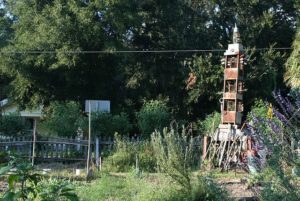
McRorie Community Garden
From the garden we went across the street to hear the Jazz Bandits play at band-members Jackie’s and Mary’s house – they live next door to HOME Van Central. We milled in the street, pretty much social distancing, but lowered our masks to eat Bob’s collards and drink Jameson’s whiskey. (Bob was a whiskey drinker.)
Every day I think of something I want to ask or tell Bob, and then remember I can’t. And Bob’s death means the end of the HOME Van. We all wondered whether there was a way to keep it going, but Bob and Arupa’s house was HOME Van Central, and the project – first the drive-outs and later the food pantry – was full-time unpaid labor.
We started the HOME Van eighteen years ago; it hurts to think of it dying. Guided by Arupa’s vision, we were tiny and improvisational, meeting people where they were, and doing whatever we could to help them, always in a spirit of friendship and a bit of anarchy. I am just at the age where people are beginning to fall around me, and each death punches another hole in my world in the unique shape of someone I love. The loss of the HOME Van does the same, for me and for Gainesville.
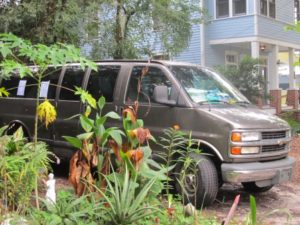
The Van

Home Van Centr
Sep 20, 2019

Arupa Freeman, aka Arupa Chiarini, is a painter, writer, and the guiding spirit of the HOME (homeless outreach mobile effort) Van. I call her the Fairy Queen because she has a mass of white-blonde curls, a loose dress, a huge Ha Ha laugh, and an invisible magic wand that invariably produces the right answer to the many quandaries that confront the HOME Van.

I knew the name Arupa Chiarini long before I met her. She and Bob Freeman were founders of the Acrosstown Repertory Theater – they ran it for ten years, writing, producing, directing, acting, administering. It was Gainesville’s out-of-the-mainstream theater venue. So Arupa was part of the Gainesville art scene, and though I occasionally attended plays, I was mostly part of the middle-class women’s do-gooder scene. She was everything cool and hip; I was everything stodgy, even though I’m still a hippie at heart.
I first met Arupa at meetings of the Homeless Coalition – she and her husband were volunteers at St. Francis House, our main homeless shelter. We were trying to create a Safe Space, where homeless people could hang out during the day. (St Francis and other shelters required residents to leave early in the morning.) Like all initiatives that include city government, it involved years of meetings, with everyone saying the same things over and over. It went on for a couple of years, and it resulted in nothing. But it allowed the city to say it was addressing the problem of homelessness.
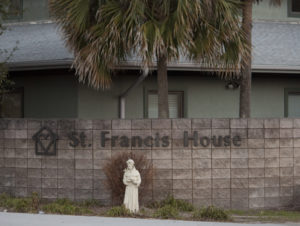 image: shelterlistings.org
image: shelterlistings.org
At one point during the Safe Space campaign some firebrands decided we should camp out in front of city hall. I ran into Arupa at Goerings bookstore and confessed I was scared. Sleeping out on concrete in the middle of a crowd seemed like too much for me, and I had never been arrested. She was scared too, though she had been arrested once for lying down in front of a bulldozer that was about to knock down a tree.
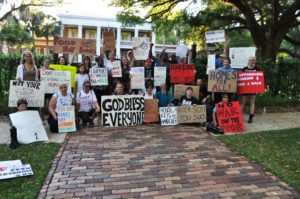 picketing City Hall
picketing City Hall
The plan for camping dwindled into daytime pickets at City Hall. Arupa and I shared a two-hour shift, and that’s when we began to talk – about books, people, our lives, She grew up in Vermont, went to college in Oklahoma, spent years in an ashram in Carmel, and more years as an editor at McGraw Hill. After many years of talking, now I know she was intimidated by me, as I was awed by her. She saw me as the Episcopalian – everything snooty and proper and uppercrust.
 image:Vermontdirtroad from Arupa’s blog
image:Vermontdirtroad from Arupa’s blog
http://vermontandotherstatesofmind.blogspot.com/ (This blog contains a lot of Arupa’s poetry, and some lovely pictures by her and others, as well as a Willie Nelson song.)
Arupa and Bob quit volunteering at St. Francis House when, after a new director took over, it became a place more concerned with regulating than welcoming homeless people. They invited a few friends to meet in their living room, to find a better way to help the people living in the woods, and that was the birth of the HOME Van.
We began in September 2002, with 283 jars of peanut butter, 283 loaves of bread, and $283. Arupa and friends rode around town hanging bags at the end of every trail into the woods, with bread, peanut butter, and a note saying we’d return. The drive-outs evolved until we were delivering homemade soup, food bags, medicine, clothes and socks, tents and other items to campsites and parks twice a week. This continued for over thirteen years. We never got government funding or a grant, but the community supported us, and every month I wrote thank you notes for the checks, large and small, that regularly arrived in the mailbox.
 The HOME Van and Bob’s garden
The HOME Van and Bob’s garden
Four years ago Grace Marketplace, a homeless services center, finally opened in Gainesville. All the HOME Van volunteers were getting older, some sicker. So the Van stopped running, and Arupa, Bob and a few volunteers continued helping the poor and homeless with a food pantry. It’s officially open one day a month, when long lines of people wait patiently at the front door. But food bags and other supplies are always available for whoever knocks on the door, and there are several visitors a day to HOME Van Central, Arupa and Bob’s small house.
The house is half a block from the oldest community garden in Gainesville, six blocks from St. Francis House. The living room contains a refrigerator and shelves of canned food, dried soups, coffee, crackers, over-the-counter drugs and toiletries. Packed food bags, cartons of more food and supplies, tents, blankets and other donations make an obstacle course as we hurry to fill requests from the people at the door.
The walls are covered with paintings by Arupa and Bob, and Arupa’s easel is always at the ready. Bob keeps a flower bed going by their front walk. When their house was Gallerie Bob, there was an art fence festooned with found objects, but that has not been renewed in many years.
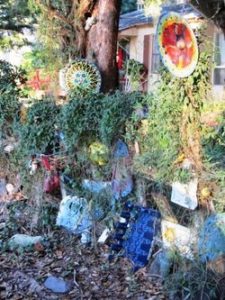 The art fence
The art fence
Arupa and I became close friends through the many years of the weekly drive-outs. She is one of the more literate people I know, particularly well-versed in philosophy, literary classics, and mysticism. She also has an encyclopedic mastery of old G-rated sitcoms and the lives of 1950’s celebrities. When Elizabeth Taylor died, Arupa delivered a long, loving eulogy to me and Larry, my sandwich-making partner at the kitchen table.

Her opinions are fierce and certain topics recur: the villainy of city officials, the imminent collapse of the economy and the environment, increasing poverty and cruelty, the limitations of allopathic medicine. (Arupa relies on homeopathic medicine and acupuncture, and was only sick twice in the years I’ve known her until a serious accident about three years ago.) She delivers her judgments with a conviction that makes my contrarian self silently argue the other side. These are all topics on which I have fuzzy views, often in line with hers, but too little knowledge to speak in the face of certainty.
In the early days of the HOME Van there were fewer homeless people in town, and Arupa and I had more room for frivolity. The first spring Arupa and I colored Easter eggs for the food bags. I took her canoeing down the Itchitucknee, one of many spring-fed streams near Gainesville. She included me in the local art world – once I performed in her play, Primary Colors, at an art gallery, and twice she invited me to read at Wild Iris, our feminist bookstore. For a perennially unpublished writer, these were thrilling occasions.
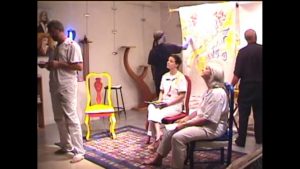 Primary Colors
Primary Colors
https://www.youtube.com/watch?v=6ayAc-v_erk
Sometimes we’d find time for lunch on my backyard deck, or an evening together with Bob and my husband Joe Jackson. The conversation was exhilarating; sometimes I think that between them, Arupa and Bob know everything worth knowing.
The HOME Van is not what it was in the days of twice-weekly drive-outs, and I think we all miss it. In the HOME van we had the privilege of operating from our hearts and instincts, unlike the many good-hearted workers in agencies. We’d often hear from homeless friends that what they liked about the HOME van is we took them at their word. Tell us you’re hungry, we’ll give you some soup; and if there’s enough, we’ll give you seconds. If you need an extra food bag to take to someone else, we believe you. We would rather be snookered occasionally than treat everyone with suspicion.
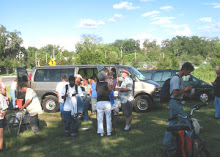 Getting goodies at the HOME Van
Getting goodies at the HOME Van
Despite Arupa’s serious accident, followed by a life-threatening infection, she and Bob have kept that spirit alive. Though food pantry days are pretty frenetic, the three volunteers filling food bags and gathering supplies are always ready with a friendly word and listening ear. And on the other days, when only two or three may seek help, Arupa has the time to talk with people, listen to them. We deal with a lot of people who never come into the organized agencies.

Some people wear bracelets saying, What Would Jesus Do, though I haven’t noticed them acting particularly Christ-like. Many homeless people, and many people who don’t know Arupa, consider her a saint. She is anything but saintly, and HATES the accusation, as she hates receiving awards, but when I’m puzzled about helping people who are down and out, I ask, “What would Arupa do?” She has a clear moral vision that lets us focus on the basic question: how can I help?
From her I learned that if someone is hungry you hand them a sandwich; if they have blisters you give them a bandaid and clean socks. You meet people where they are, with respect and friendship. Some will find their way out of the woods, and you stand ready to support and help with that. Many will not, but if they are hungry they need food. Worthiness is irrelevant, and not ours to judge.
Bob and Arupa do most of the work of the HOME Van. She listens to stories and learns names, and the people who live in the woods have her phone number. When someone is sick, when the city is once again clearing a camp, Arupa knows who to call. She is the truest exemplar I know of my favorite saying: “Light a candle AND curse the darkness.”

ARUPA’S BLOG
For many years Arupa wrote a blog about our drive-outs and the people we encountered. I have been browsing through it as I work on this post,. I can’t stop reading; I’m laughing and crying. She writes beautifully, sometimes prose, sometimes poetry. It brings back so many memories, and her soul shines through. I’m giving you just one sample of the hundreds of posts, and encourage you to go find more.
from http://homevanblogspot.com
A CONVERSATION WITH ‘MOM’ (2009)
She got her street name because she takes care of people. I met her in the winter of 1994/1995. An overly zealous night manager at one of the local shelters evicted an old man with Alzheimers because he smoked in his room. It was a January night with temperatures in the thirties. After a few choice words about “Why the **** didn’t he just confiscate his cigarettes?” Mom took this old guy to her tent and kept him warm through the night.
A few months ago she actually managed to get me to do snuff outreach (with my own money, not Van money). She found an old, old man named Earle living in a shack near Tent City. Earle, who was well into his eighties, showed signs of senile dementia. He had a pack of half-starved cats and he himself was not doing so well.
Mom got some groceries and cat food from me and then said, “I need five dollars toward a tin of snuff.” Arupa: “You’ve got to be kidding. We don’t do snuff outreach.” Mom (tears running down her face): “He’s 86 and he’s been dipping snuff since he was 12 and he’s just sitting out there jonesing and jonesing…” Arupa: “Okay. Snuff outreach it is, coming right up.”
Mom and I were discussing the economy yesterday. She said that Day Labor had dried up so bad people aren’t doing drugs out in Tent City because they don’t have the money. I asked if she knew how business was for the ladies who work on SW 13th Street and she told me that it’s really down. Now, this is a side of the economic downturn you aren’t going to hear about on MSNBC – It’s BREAKING NEWS in the HOME Van Newsletter.
It got me to thinking about the Web of Life with the endless interconnecting tapestry of cause and effect. There is much suffering connected to this Great Recession, and will be for a long time to come. Can it be that there are also little miracles – lotuses growing from the mud – silently sprouting and putting forth roots? People planting vegetable gardens, people playing board games with their children because they can’t afford to go out – people in Tent City getting a “time out” from the nightmare labyrinth of doing drugs and turning tricks – a silent place where something new might grow. I believe in this.
BOOKS! GAMES! SOAP!
That’s what we need. Hallelujah for Spring and long evenings when people can read and play cards. This summer I am going to emphasize recreation in the Socks 4th Avenue section of the Van, with your help. Art supplies are good also, and anything else you can think of that is fun We are also low on personal hygiene products.
ENJOY THE WEATHER!!!!
Love and blessings, arupa

Mar 1, 2015

Last Thursday, February 26, was the last HOME Van drive out. At all three stops we saw mostly familiar faces, and some people who are very dear to me. Many people came up to Arupa to say goodbye and get a hug. I occasionally hid behind a car to cry. I only lost it completely when I said goodbye to Mike, one of the sandwich makers, whom I have come to respect and admire as he and his wife nursed a friend whose house they shared.
The house, a small bright green geodesic dome, was built for the owner by several homeless men, who lived there on occasion. Showers and laundry were available on a regular basis, and there was a small food pantry. Gainesville is dotted with informal, almost clandestine services for homeless people, in homes and churches, and in our case, in an old gray van and a couple of cars.

Arupa and Bob Freeman, whose house is HOME Van Central, and who have been working 40-60 hours a week to run the project, are well past retirement age. The growth of services at Grace Marketplace, the new center run by the Homeless Coalition, has brought our numbers down, and the time has come to shift direction. Arupa and Bob will run a small food pantry, and respond to individual needs and emergencies. We will still deliver water to campsites in the hot months. Our main focus will be to buy tents for the people who want to move near Grace Marketplace, where people can get hot meals, showers, and many other services.

sunset and rainbow at Grace Marketplace photo by Greg Undeen
We all have our favorite driveout memories. One evening, going through the medicine boxes, I came across a bottle of flavored personal lubricant. “Who the fuck donated this?” was my ladylike reaction, and Arupa and I had a giggle. But a little while later a man and woman came up to the van window and shyly told me they had gotten married a few days ago. They were beaming with happiness. I slipped it into her bag – a lot of the women we meet are modest about intimate items. She thanked me the next week, and every once in a while I brought another bottle of lubricant for the honeymooners.

A woman in her sixties lived in a tent on the dental lab property in Tent City. She had greasy gray hair and filthy feet, but she had a strong sense of dignity and self-respect. The winter that she got a week-long cold night motel voucher, I brought her a bag of groceries. She opened the door in her bathrobe, with her long hair wet from the shower, and I realized that I had thought of her dirtiness as part of her. I was struck once again by my ignorance.

After the Bath by Edgar Degas
When she turned 65, I took her to apply for Social Security, and discovered she had been married five times. It was quite an enterprise for her to recall all the names and dates. The Social Security official was polite and patient. Not long after, she married again, to a 28-year-old man, and the HOME Van held a wedding ceremony. The bride spent the morning at the beauty parlor, and then I drove them to the downtown plaza, she in her white dress and veil, he in a tuxedo, where Reverend Dave, the HOME Van minister, married them.

image: worth1000.com
I have so many memories of the early days of the HOME Van, when the numbers weren’t so crushing, and we had more time for frivolity. Arupa and I spent an afternoon decorating Easter eggs to distribute on the driveout. At our first Christmas party I passed out song sheets, and my brother Don led the singing on his harmonica. On our third anniversary we had a big party on the downtown plaza, with ribs and chicken donated by David’s Barbeque, and a band of homeless pickers and singers. Less frivolous were the memorial services we held on the plaza – a circle of people holding candles, speaking of their friend who was gone, and Reverend Dave saying a few words of comfort and faith.



image: bangordailynews.com
As one of my very favorite customers said when he heard that the driveouts are ending, “All good things must end.” I have tried to understand why this makes me so sad. I won’t miss boiling ten dozen eggs, or as I used to do, baking five batches of cornbread. I won’t miss organizing the soup rota, or making five to seven gallons of soup when I had no volunteers.

we usually did better than beanie wienies
I won’t miss making sandwiches on Thursday mornings, turning six loaves of bread into pb and j’s. But I’ll miss the other sandwich makers, three men whom we met years ago on the drive-outs, all now housed. Arupa puts on Pandora, usually old country music or rock, and we talk as we work. Lots of gossip – celebrity gossip, local politics, who’s sick, who’s in jail. Personal history and family stories, what’s going on in our lives. Lots of joking, lots of teasing, especially of me.
I won’t lose track of one of the guys. He lives near me, and we rode together every Thursday to sandwich-making and then to deliver a food box to a former HOME Van customer. In the afternoon I’d pick him up to go to the drive out. He house sits for us when we go away, and now that he’s losing his HOME Van gig, he’s going to come walk our dog on weekday mornings. But I know I’ll rarely see the other two. I remember how close I was to my colleagues at the law school, and how quickly we lost touch. There are work friends and friend-friends, and you lose touch with the former when you retire.

Trisket needs her exercise
I have so many memories of so many people. A gentle schizophrenic man in many layers of clothing and scarves. It was years before he would look me in the eyes with the sweetest smile, and ask for “whatever you have.” I settled on giving him vitamins and bandaids and Tums. Another man, of enormous intelligence, integrity and courage, who has been in the woods since he was released from prison, where he spent fifteen years for avenging his daughter. A man who moved to the woods so he could support his daughter in college with his small Social Security check. I’ll miss the hugs, the jokes, the God bless you’s, the homemade card Rose gives us at Christmas.

image nydailynews.com
For years I was in charge of socks and candles, dispensed from the trunk of my car. This sounds tedious, but each transaction was a little connection. Can I have some dress socks for church? Do you have any more of those diabetics’socks? When we had more volunteers I graduated to medications, freeing Arupa to wander in the crowd and talk with anyone who needed something special, or merely a dose of Arupa.

image: sockittoemsockcampaign.org
I liked distributing medicines, because it gave me genuine, if brief, contact with a large number of people. I’m no good at names, but people expected me to remember their illnesses and injuries, and I often did. I sat in the passenger seat of the van, with a daunting line of people at my window, stretching around the parking lot. I heard of many ailments. People like to show their wounds. I have a weak stomach and would always let my eyes go out of focus when confronted by scars, stitches, burns and boils. I’d urge them to go to Helping Hands or the Rahma Mercy Clinic, the emergency room or the VA.

Rahma Mercy Clinic image: sam felter
I remember the woman who lived in Tent City and rode her bike to chemo treatments at Shands, the man who was between two surgeries and living with a temporary colostomy bag, the woman I saw on our last drive out, who had major abdominal surgery four days ago, and was about to start radiation. People were discharged from the hospital, sometimes sent home in a taxi to the trail that led to their camp, with expensive prescriptions which they couldn’t fill. Arupa carried some cash and could sometimes help, but often the cost was beyond us. We could give them ibuprofen and acetominaphen, but no real pain meds. We had bandaids and ointment, but no antibiotics.

image: theguardian.com
I retired more than eleven years ago from the law school, and never looked back. The only thing I was going to miss was my students, and even them, not so much. At the time I retired, the HOME Van was less than a year old. Now I’m facing a second retirement, and I’m not looking forward to it.
In all the years of riding with the HOME Van, I only saw the tip of the iceberg. After a winter drive out in the freezing rain, or a summer drive out where we fought mosquitoes and gnats, I struggled to wrap my imagination around how it would be to live homeless. People who live outside have complicated lives. Some of them traveled, many stayed put. I was just a tiny part of their lives, but they were a huge part of mine.
To JC and Gary and DJ and Rose, to Buddy and Michael and Bill, Matt and David and Nick, to Wanda and Nina, Diane and James, Nate and Judy, Ashley, Tommy, Renata, Charles. To all the people who live or have lived outside, coping every day with hardships and troubles I can barely imagine, making their happiness with or without booze and drugs, I will miss you more than I can say or you will know. You have blessed my life.
FOR MORE ABOUT THE HOME VAN AND HOMELESSNESS IN GAINESVILLE, GO TO CATEGORIES/HOMELESS, AT RIGHT
Dec 7, 2012
People of my political ilk were pretty thrilled, or at least relieved, by the outcome of the last election.

Brooks Kraft / Corbis for TIME
All of us lefties had complaints about the first four years of Barack Obama, but we also spoke of his administration’s many unheralded accomplishments. Here’s one you likely never heard of: the No More Homeless Vets initiative, announced in 2009 by Eric Sinsheki, Secretary of the Department of Veterans Affairs (VA). click
In this initiative, the Department of Housing and Urban Development (HUD) provides rental vouchers, and the VA provides outreach and case management, as well as other services to support people once they are housed. This program is for people with serious mental illness, physical disability or substance abuse history. According to the VA, “Veterans with the most vulnerability are excellent candidates for this program.”

source:nursing322sp10.wordpress.com/homeless-veterans/
I am a veteran, not of the armed forces, but of forty years of studying, navigating, advocating in, and being subject to government poverty programs. So when I see the words “job training, employment assistance, mental health services, housing assistance,” I am not impressed. I know that all these programs can suffer from eligibility hurdles, peculiar rules, inept staff, and most of all, severe resource limits that let them serve only a small percentage of the people who need them. And they are targeted at people who are the hardest to help. After childhoods of appalling abuse, adulthoods of self-destructive behavior, and for combat veterans, a government-sponsored season in hell, some people will never be what we choose to call self-sufficient.**

Season in Hell
source:mindprod.com/politics/iraqwarpix.html
But last year the VA announced that the number of homeless veterans had been reduced 12% from 2010 to 2011. Since 2009 the VA-HUD program had successfully housed 33,597 Veterans in permanent, supportive housing, providing case managers and access to VA health care.
Of course they’re tooting their own horn. The VA blog contains plenty of complaints from veterans who still aren’t getting what they need from the system. click I have no way of evaluating the program on a large scale. But I have seen it succeed here in Gainesville, one person at a time.
For me this initiative is personified by the outreach workers who accompany the Home Van on our weekly campsite rounds. Many homeless vets are discouraged by bureaucracy and especially suspicious of the VA – they will not seek out services. So the VA workers go to the woods to find them. The workers find out what the veterans need – documents, legal assistance, health care, drug treatment, vocational certification – you name it – and come back week after week to move the cases along.



One by one, every month or so, one of the men or women living in the woods tells us, “I’ve got an apartment. I’m moving in next week.” John*** and Deena, both vets, have lived in a tent in the woods at least as long as the HOME Van has been going out. John is reserved, Deena more open. She always had a hug for me when I gave her socks; I’d say ‘How’s it going?’ and she’d shrug and smile. When she told me they were moving into an apartment, my first thought was ‘Oh no, we won’t see you anymore.’
Mad Mack is a scrawny old vet, a Led Zeppelin fan, who’s been housed for two years. He comes by the HOME Van many evenings just to see his old friends. I’m sure his case manager knows he smokes reefer – he makes no attempt to hide it.
Felipe is a blustering, obnoxious guy, eager to tell anyone who’ll listen why he’s better than ‘those bums.’ Last week he told us he’s about to move into an apartment. I was thrilled, as I had been for all the others. If The Feminist Grandma’s affection were key to being housed, there would be an awful lot more people on the street.
The VA has chosen the right way to help homeless veterans. They work one on one, encourage and nag, help navigate the mazes of different agencies, until finally the veteran has housing. Then they help with the many challenges in transitioning from camping in the woods to living inside.

The HOME Van at home
The HOME Van has long experience with this approach. Our volunteers have helped a few people find housing, and then shored them up in various ways – dealing with bureaucracy, taking them to medical appointments, even managing their money. Though we have way less money than the federal government, we have the advantage of being ruled by our hearts rather than regulations. click
The VA Secretary says, “No one who has served this nation as a veteran should ever be living on the street.” But I hope the No More Homeless Vets initiative will be a model, and we will extend these services to the homeless people who are veterans not of the military, but of a thousand hardships most of us can’t imagine. Some will continue habits that middle-class people simultaneously frown on and indulge in.

source: kushmagazine.com
But stoned or sober, employed or not, anyone is better off living inside, and the whole community is better off when nobody has to live in the woods.

source: The Gainesville Sun
** None of us is self-sufficient. We depend on family, friends, and an endless array of public benefits: roads, airports, police, libraries, schools, emergency response – that’s just off the top of my head, early in the morning.
*** All names are fake, of course.
Jan 20, 2012
When I was in college everyone took a personality test. We ridiculed the question that asked whether you preferred carrots raw or cooked, and assumed it was about sex (wasn’t everything?)


COOKED OR CRUNCHY?
But I also remember being asked to agree/disagree with statements such as “Success in life is largely a matter of luck” and “I can control my destiny.” As I understand it, your answer to these indicates your sense of efficacy and likelihood of success. If you think life is largely a matter of luck, you’re out of luck.
But so much of life is determined by luck. You walk along happily for awhile, doing whatever it is you do, and then life comes along and snatches the rug out from under you. The personal calamities: dread disease, business failure, loss of a loved one. The public calamities: hurricane, riot, economic collapse. Any of these will knock you flat.
Wise advisors, such as self-help books and grandmas, say that though you can’t control what happens to you, you can control your response. While some are defeated by fortune, others rally and stand up again, like one of those little dolls with a rounded, weighted bottom. No matter how many times you knock it over, it pops right back up.




So where do we get our optimism, the courage to fail, the will to keep trying? I say pluck is also a product of luck. If we are very fortunate perhaps we are born resilient, but I think for most it is nurture, not nature. And our luck resides in the circumstances of our birth.
I have an image of babies, each set at the beginning of a path. On every path there are hurdles. On some paths there are small, regularly spaced hurdles, and at each early hurdle, hands reaching out to help the child clear the bar, voices raised in praise when she does. On other paths the hurdles are high as a house, and the child is alone. Some rare few of these children – and who knows the source of their strength? – will clamber over and move on, but many more will be defeated.

PERDITA FELICIEN AND DAWN HARPER
I used to ask my law students why the homeless victims of hurricanes receive assistance and compassion, while the world scorns the chronically homeless, whose lives were blown awry by abuse, war, illness. And they would reply that the chronically homeless people were responsible for their own situation, and should help themselves. Yet the students knew very well that for some people the deck is stacked from the beginning.
Puzzling over their need to blame the victim, I thought it was hard for them to acknowledge the role of luck in their own success. They wanted to have control. And if they believed they had not earned their many advantages, they would feel guilty. Even more, it was important to believe that the losers had brought their troubles on themselves. Otherwise, what was to prevent the same thing from happening to them?
I’ve had a lovely life, full of friends and lovers, a late and happy marriage, interesting work, adventures, travel, and even economic security. The primary reason is that I’ve been lucky. Of course I’ve met my share of hurdles, and worked hard, but I was lucky to be born into a family that blessed me with enthusiasm, optimism and resilience as well as material well-being.
There were plenty of weeds in the family garden – alcoholism, tyranny, petty snobbery. For me they were hidden by the flowers. My parents assumed I would succeed in school and in life. My father was an optimist until the day he died. He was also overbearing, but because I was the last child, I wasn’t the star of his dreams, which meant I had room to move. My mother was gloomy but loving, and I was very close to her. They were both voracious readers. They had more than enough money, and happily they valued education and experience over stuff, so we had excellent schooling, travel and adventure in our lives.


As one of the lucky ones, I hope to repay my debt to fortune with compassion and appreciation. I should keep my heart open to the one who has not been lucky. I can’t walk a mile in her shoes – she’s wearing them, and only she knows how they hobble, where they pinch. But I should meet her where she is, and help where I can.
And I should appreciate good luck while I have it; it will certainly come and go. I can’t live looking over my shoulder for that figure that will snatch the rug out from under me, but I can rejoice when life is going well. Denise Levertov said it as well as it can be said:
Of Being
I know this happiness
is provisional:
The looming presences –
great suffering, great fear –
withdraw only
into peripheral vision:
but ineluctable this shimmering
of wind in the blue leaves:
this flood of stillness
widening the lake of sky:
this need to dance,
this need to kneel:
this mystery.
in Breathing the Water (1987)
click
Nov 25, 2011
(Of course I’ve changed the names, and a few details, to preserve the limited privacy of our homeless friends.)
The HOME Van arrives at the Downtown Plaza, our busiest stop, at 5:45 on Thursdays. A long line forms for food bags, followed by a line for soup, cornbread and hot chocolate. A smaller line waits at the front of the van for medicine. At the back people search through clothes, toiletries and books. And a few people stand in front of me where I sit near the van, sorting socks to find what suits each customer: “You want short or long, dark or white?”

HOME VAN AT HOME


HOMEVAN STUFFED WITH STUFF
Old friends, old enemies, and strangers stand in line together, loud or quiet, lively or withdrawn, all hungry, most homeless. Hugs, greetings, insults, jokes, gossip – who’s in jail, who’s in the hospital, what happened at the church dinner the night before.
Sometimes there are angry complaints – “How come you never have batteries?” but more often gracious, generous words – “You are a blessing,” “No, give it to Mr. Watson, he needs it more than me.” (Mr Watson is over 80.) There are more men than women, more black than white, more middle-aged or old than young.
Times are always tough at the bottom; you might think a poor economy wouldn’t make any difference. But work has long since dried up at the labor pools. Shelves at the food banks empty quickly every week, and at every agency demand is up and donations down. There are more homeless people now. The annual count in Gainesville used to find about 800 people; now there are 1500.
We never used to see children at the HOME Van, but now we often do. Recently Laquita has been a regular customer. She has a toddler in a stroller, and 6-year-old Shontelle. Laquita waits patiently in line for food bags for the three of them, each bag with a peanut butter and jelly sandwich, a hard-boiled egg, an orange, a granola bar, and a bottle of water.
Shontelle stands by her brother. Her hair is neatly braided in rows and plaits, and she wears the same public school uniform as Amanda – a polo shirt and pants. She watches our motley crew of customers with lively eyes. Little Franco, bleary-eyed, leaps into the lap of a fat woman in a wheelchair. Her thin cotton dress falls alarmingly low off her shoulders. Joseph and Isaiah argue over a place in line, their expletives rising louder and ruder and then subsiding into muttered insults. Michelle wears all her clothes at once – pants, skirts, shirts, sweaters, her head wrapped in shawls.
Arupa and I try to have a special gift for the children who show up – a stuffed animal, a book, a notebook and pretty pen. I ask Laquita, “Do you think the kids would like this teddy bear? She smiles and calls Shontelle over. Without prompting, Shontelle thanks me and takes the teddy bear to her brother, makes it dance and talk for him.

GIFTS FOR THE KIDS
More than the children, it’s the parents I ache for. Living in a car, a church, a homeless shelter, they struggle to give their children a normal life. They are ashamed that they cannot provide, humiliated at taking the kids to a soup line. But the worst is the fear that protective services will take the children away.
Last year I took Amanda to the HOME Van Christmas drive-out, when we give out the Christmas stockings stuffed by people all over town. They are white tube socks stuffed with candy, perfume, batteries, flashlights, toys, all sorts of treats that say “People are thinking of you, people care that you are living in the woods.” With her best company manners Amanda handed out socks and candy canes, and helped eat the cookies.

HOME VAN CHRISTMAS STOCKINGS
A few weeks ago Amanda and I hosted dinner for the families who were staying at our church. Hosting is easy. With another volunteer we put out the food, eat dinner with the guests, and clean up afterwards. This time there were three families, including four young children and two older boys.
After dinner Amanda went out to the playground with the children, but Darnel, the oldest boy, stayed behind to talk with me and the other volunteer. He was a comical delight – full of 14-year-old braggadocio and wiseacre remarks. His uncle had moved with him and his younger brother from Detroit in August. They had spent the previous week in a motel, and would move the next week to another church. Darnel was enrolled in the prize-winning performing arts program at one of our magnet schools. He said school was too hard. “At least you’re not bored,” I said. “Yeah, but I can’t sleep in class, so I’m tired all the time. They should let you sleep if you want to.”
We discussed rules that we think are unfair, and I offered rules against peeing in public. Darnell thinks those are good rules. “What can you do if you don’t have a home? You still have to pee.” “Yeah, but how would you like it if you were walking down the street and some guy had whipped it out and was peeing?” “I’d walk behind him.” “Yeah, but what if he turns around suddenly and it goes all over your leg?” “I’d wash it off.”
Amanda played with the other kids until well past dark. The littlest girl admired her earrings and when Amanda told her she had a matching bracelet at home, she said, “I wish I had a home.” Amanda said, “It’s hard not to have a home. I wish I could help you.”
I had to stay till 8:30 when the overnight volunteers take over. Joe came at 7:30 to take Amanda home for bedtime in her very pink bedroom – a hot shower, fleece pajamas, a chapter from the bedtime story, and lights out.

AMANDA'S ROOM IS JUST AS PINK – PHOTO FROM DIGSDIGS.COM
Today is the day after Thanksgiving. If you are homeless, you may have eaten three Thanksgiving meals yesterday – everybody serves free dinners at Thanksgiving and Christmas. If you are housed, you probably have a refrigerator full of leftovers.

TURKEY DINNER BY NOMADCHEF.COM AT IMAGES.GOOGLE.COM
You may feel you have been as thankful as you need to be. But take time today to be grateful for one more thing. If you are homeless, be thankful if you have no children. If you have children, be thankful if you have a home.
click for more re homeless kids
click for HOME Van
NEXT WEEK: I Got Shoes
I'd love to hear from you! Click "comments," below.







 image: shelterlistings.org
image: shelterlistings.org picketing City Hall
picketing City Hall image:Vermontdirtroad from Arupa’s blog
image:Vermontdirtroad from Arupa’s blog The art fence
The art fence Primary Colors
Primary Colors Getting goodies at the HOME Van
Getting goodies at the HOME Van